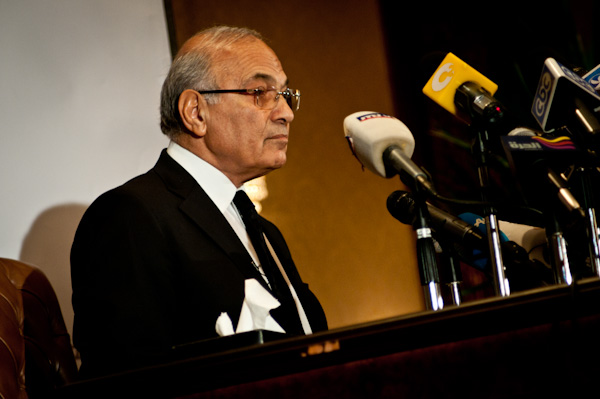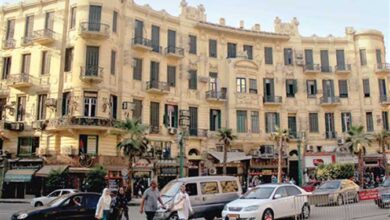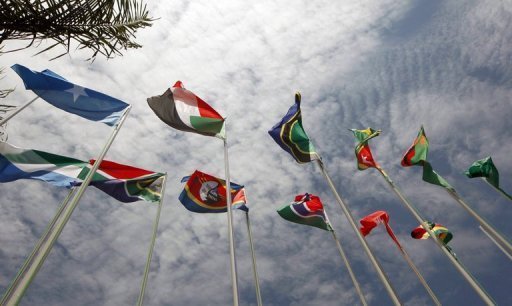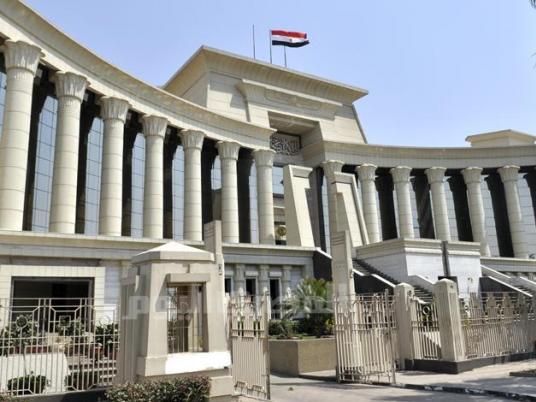
In what it falsely claims is an exclusive, private daily Al-Shorouk declares on its front page that “[Ahmed] Shafiq is out of the presidential race.” In smaller writing, however, is a clarification that this is according to a report submitted by a legal panel of the Supreme Constitutional Court.
The court is examining the constitutionality of amendments known as the Political Isolation Law to a law governing political rights, and its decision may drastically change the course of Egypt’s political transition.
Passed by the People’s Assembly shortly before the start of the presidential election, it bans former senior Mubarak-era officials from taking part in political life for a decade. Shafiq was briefly (overnight) excluded from the race under this law but reinstated after the Presidential Elections Commission accepted his appeal and sent the law to the constitutional court for review.
Al-Shorouk quotes Judge Maher Samy as saying that hearings in the case will begin on 14 June, two days before the presidential runoff. The Commissioners Panel — a body of the court whose recommendations are non-binding but may indicate how the judges are leaning — has concluded that the elections commission did not have the authority to refer the law to court for review, Al-Shorouk reports. The panel recommends that if the court does rule on the Political Isolation Law, it should find it unconstitutional.
Privately owned Youm7 asks a lawyer and a political scientist to speculate on possible scenarios surrounding the court's ruling.
Lawyer Essam al-Islambouli suggests that if Shafiq wins the election and the constitutionality of the Political Isolation Law is subsequently upheld, new elections should take place among the 12 candidates who remain.
Political scientist Gamal Zahran says that in that scenario either the original 12 candidates will compete again, or only third runner-up Hamdeen Sabbahi will take Shafiq's place against Mohamed Morsy. Zahran tells Youm7 that this is in any case unlikely because “there is a longstanding intention to make Shafiq president of Egypt.”
Al-Shorouk writes a vivid description of Wednesday’s court hearing when 13 policemen and senior officers were found innocent of killing six protesters and attempting to kill 18 others in front of the Kerdassa and Imbaba police stations on 28 January 2011.
The paper describes a violent confrontation between the mother of martyr Lofty Azzam and a police officer who refused to let her enter the courtroom. After the not guilty verdict was read out, some relatives collapsed while others directed their anger at policemen present in court.
“You knew your criminal colleagues would be found innocent, may God torture you like we have been tortured,” one woman said.
In an Al-Shorouk column, Ashraf al-Berbery criticizes Sabbahi, Abdel Moneim Abouel Fotouh and Khaled Ali, all of whom were knocked out of the presidential race during the first round, for “jumping on people’s sadness and anger” regarding the trial verdicts in the cases against Hosni Mubarak and other former officials. Berbery calls the candidates' alleged opportunism “an attempt to turn this sadness into a platform for realizing their own personal ambitions …”
Youm7 has a strange report about three dismissed judges attempting to break into the High Court in Cairo in collusion with other individuals. The picture accompanying the story shows a lineup of four young men and two women.
Speculation about Mubarak’s health and how much time he has left on the mortal coil remains a national sport and continues to preoccupy the press.
Youm7 reports that the former president's health has deteriorated in an “unprecedented” way and that on five occasions since being taken to Tora Prison he has needed artificial assistance to breathe. Mubarak is apparently “extremely depressed” and suffered a nervous breakdown. On Wednesday he was moved to a military prison in Maadi.
State-run Al-Ahram says that Mubarak is hallucinating and has lost some movement.
Youm7 also purports to reveal details about “National security’s plan to monitor Facebook and Twitter.” According to the report, this plan consists mostly of officers making friend requests on Facebook and following activists and political parties on Twitter using fake names, with the odd bit of account hacking.
There is a marked difference in Al-Ahram’s reporting of activity in Tahrir Square compared with the private press. While Al-Shorouk and Al-Tahrir report that the square is calm and is open to traffic ahead of a mass rally on Friday, Al-Ahram’s headline reads, “Tahrir is closed … for sit-ins.” The story is juxtaposed next to a report on the Wednesday attack on the High Court building accompanied by a terrifying picture of a conflagration outside the courthouse.
There is a deluge of hysteria and vitriol on Al-Ahram’s opinion page. Retired general Hossam Seweilem, a frequent commentator in the media, has a column entitled “The supreme guide and the president.”
In it he describes the Muslim Brotherhood as nothing but a “small gear in a huge machine filled with lots of gears, similar to the Brotherhood controlled by global intelligence services set on implementing the plan for the Greater Middle East discussed by [American President George W.] Bush and [Israeli President] Shimon Peres in 2003.”
In his column “Oppression or chaos,” former head of the Journalists Syndicate Makram Mohamed Ahmed laments Egyptians' inability to stick to a long-term plan during the entirety of their recent history and their failure to learn from previous mistakes.
Ahmed lambasts the refusal of a “number of political forces to accept the results of the first round of the presidential election and their refusal to accept the rules of democracy.”
Egypt’s papers:
Al-Ahram: Daily, state-run, largest distribution in Egypt
Al-Akhbar: Daily, state-run, second to Al-Ahram in institutional size
Al-Gomhurriya: Daily, state-run
Rose al-Youssef: Daily, state-run
Al-Dostour: Daily, privately owned
Al-Shorouk: Daily, privately owned
Al-Watan: Daily, privately owned
Al-Wafd: Daily, published by the liberal Wafd Party
Youm7: Daily, privately owned
Al-Tahrir: Daily, privately owned
Freedom and Justice: Daily, published by the Muslim Brotherhood's Freedom and Justice Party
Sawt al-Umma: Weekly, privately owned
Al-Arabi: Weekly, published by the Nasserist Party
Al-Nour: Official paper of the Salafi Nour Party



